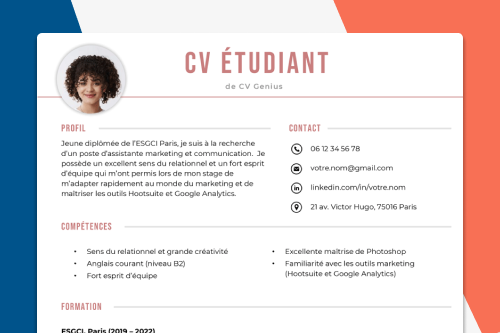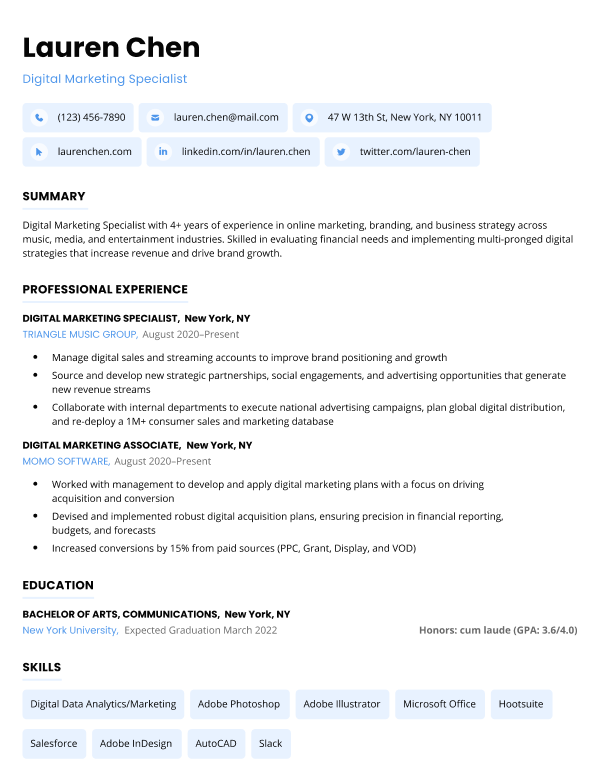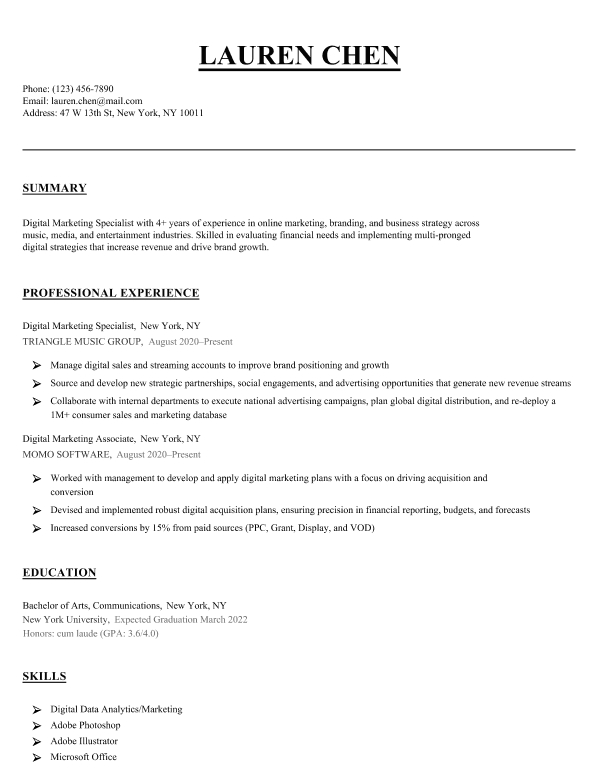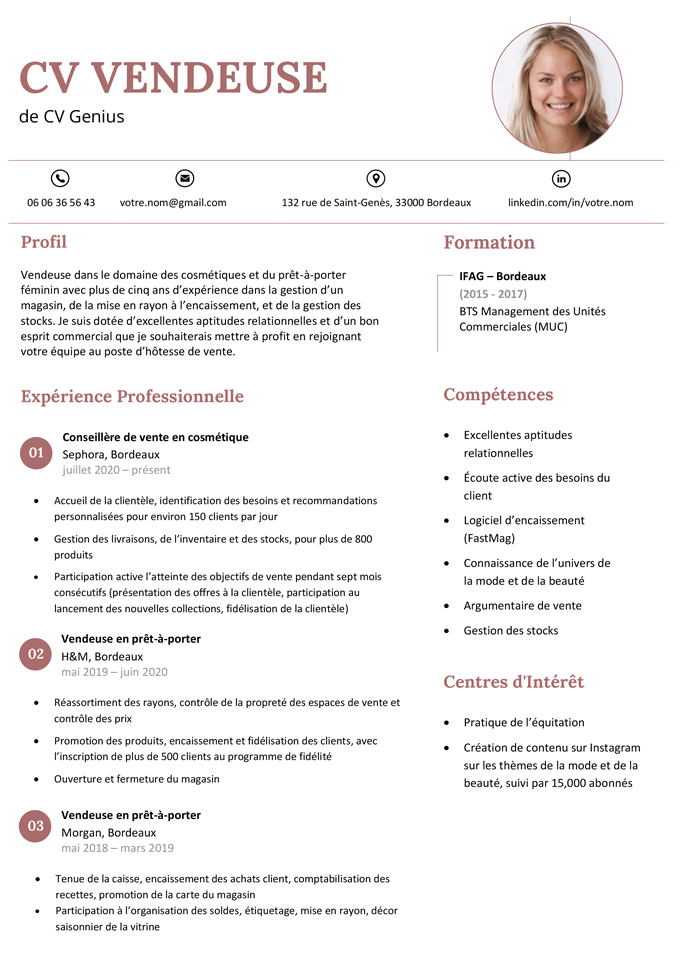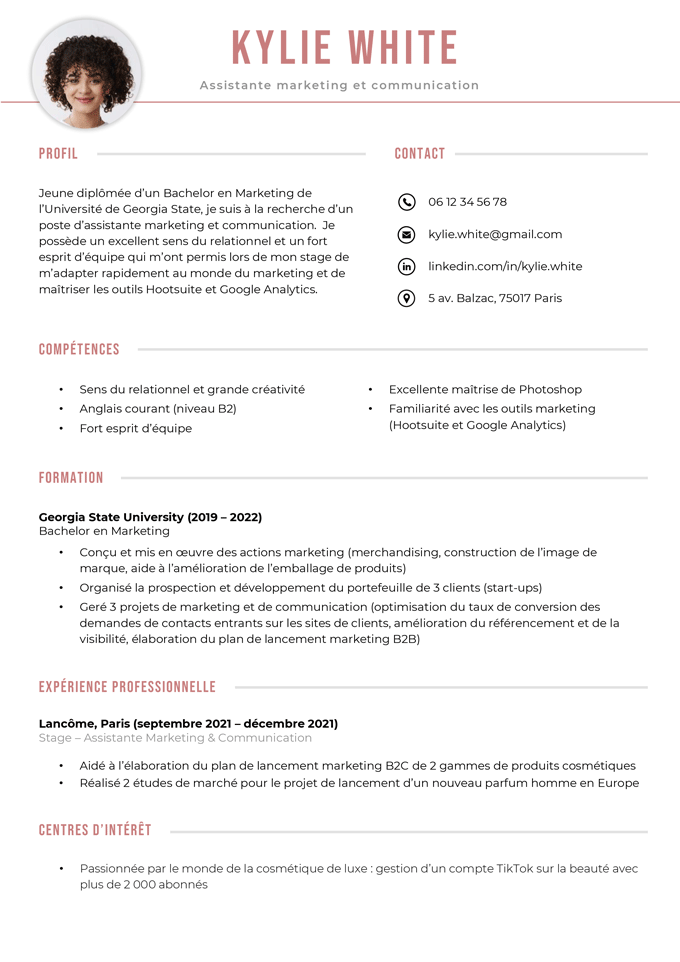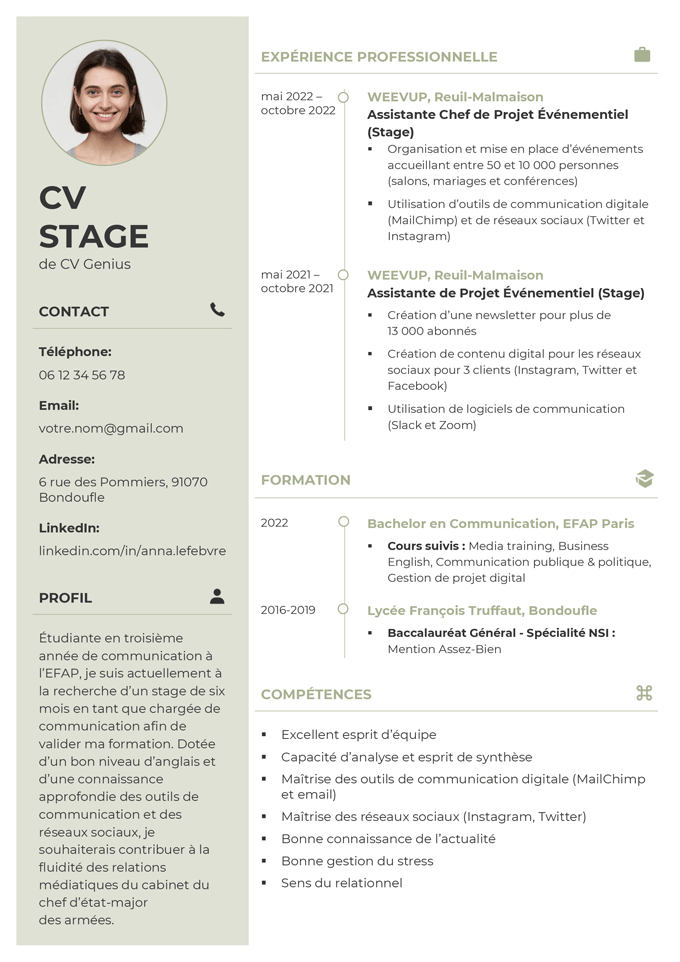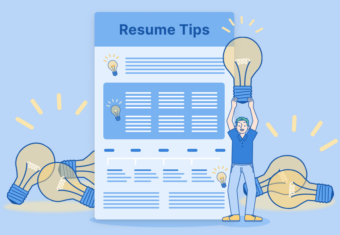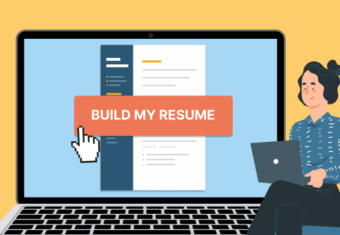Are you looking for employment in France? The first thing you’ll need to do is learn how to make a resume in French.
Before we dive in, it’s important to know that the term “resume” isn’t used in France to refer to a document summarizing your professional background. Instead, the term “CV”, or “curriculum vitae”, is used.
In this article, we’ll break down how to write a French CV step-by-step and provide you with templates to guide you.
Our free-to-use resume builder can make you a resume in as little as 5 minutes. Just pick the template you want, and our software will format everything for you.
French resume template
Before you start writing your French CV, you’ll need an effective French-language CV template.
Here’s a professional CV example for a salesclerk with a photo in the header:
If this is your first time looking at a French CV, you’ll notice the layout isn’t much different from a US resume at first glance, with the exception of the photo.There’s no set rule to using a photo on your resume, and it remains optional (to avoid unlawful discrimination). Recruiters do, however, appreciate seeing how you present yourself on your CV.
Here are three instances when you should seriously consider adding a professional photo to your French resume:
- An employer may request it during a job offer
- You’re applying for a position where professional appearance is essential (flight attendant, receptionist, salesclerk)
- You wish to make a positive impression
Additionally, it’s not a good idea to directly translate your resume from English if you want your French CV to look like it was written by a native because online translators will still make mistakes that will read unnaturally.
What to include on your French resume
Here’s a breakdown of resume parts with their French equivalents to help you better navigate a French CV:
- Profil – Resume summary or objective
- Contact – Contact information
- Compétences – Skills
- Expérience professionnelle – Work experience
- Formation – Education
If you don’t have much work experience and need to fill up your French CV with other job-relevant information, here are some additional sections to add to show off your qualifications and personality:
- Certifications – Certifications
- Bénévolat – Volunteer work
- Centres d’intérêt – Interests
- Projets personnels – Personal projects
- Langues – Relevant language skills
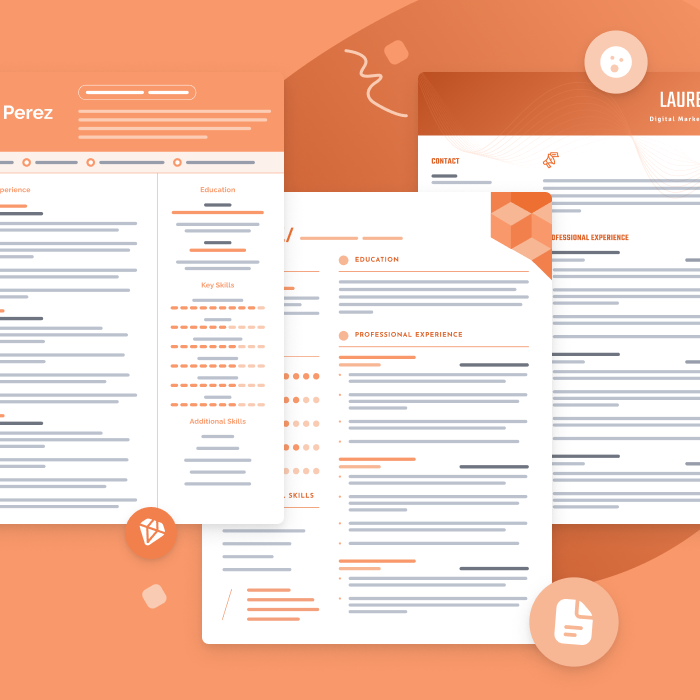
The best resume templates for 2024
One of the best ways to make your resume is by filling out one of our free resume templates. All our templates are designed by experts and free to download for Microsoft Word or Google Docs.
French CV examples
Below you’ll find a couple of examples of CVs in French you can use as inspiration when writing your own. If you’re looking for a job as a student or an internship in France, these professional CV templates will help you highlight your qualifications the right way for a French employer.
French CV example for students
If you’re a student, you may be looking for a summer job or a part-time job to help fund your studies abroad. In this case, consider writing something along these lines:
French CV example for interns
If you’d like to start your career in France, try writing an internship CV similar to this one:
How to write a CV in French that lands you a job
Writing a French CV doesn’t have to be complicated: we’ll break down the essential information you need to include so you can land that interview.
1. Use proper formatting
A French CV is similar to its US counterpart in many aspects, such as font, font size and margins. You’ll want to ensure your CV is visually appealing and legible by sticking to the following resume formatting guidelines:
- a professional font (Times New Roman, Georgia, Arial, Cambria, Calibri, Helvetica)
- a font size between 10 and 12 points for regular text and 14 and 16 points for headers
- margins of 2.5 cm on all sides (1.5 cm minimum at the bottom)
Like a US resume, a French CV should be limited to one page ideally.
Where a French CV differs is in the choice of colors for your resume: choose one to two complementary colors and avoid overly bright or flashy tones that can be hard to read in print and distract.
While many recruiters will prefer more traditional colors like navy, gray, and black, don’t be afraid to show a little personality with a simple CV design that features pops of color.
2. Start by creating a professional header
Just like a resume, French recruiters will expect to see a professional header at the top of your CV. You’ll want to include the following:
- first and last name (don’t use “Curriculum Vitae” or “CV” as your title)
- target job title
- email address (use a professional email address like john.smith@gmail.com)
- mobile phone number (including the country code if you’re not in France)
- link to a professional profile or LinkedIn page (consider adding your profile in another language)
While it’s not required to add a postal address on your CV, avoid adding it altogether if you’re not based in France at the time of your application. Be honest about your availability and which city you’ll be based in when you write your cover letter (or lettre de motivation).
Here’s an example of how to write your mobile number correctly on your French CV:
For a US mobile number:
+1 240 523 0505
For a French mobile number:
06 32 63 45 67 or 06.32.63.45.67
Additionally, you’ll often see older versions of French CVs featuring the candidate’s age or date of birth, nationality, and marital status. Any of the previously mentioned information could encourage discrimination and should not be included in your header.
While you can add your nationality, we recommend mentioning your visa type to give a recruiter an idea of your availability.
3. Add a resume introduction (‘profil‘)
The French equivalent of a resume introduction will often be referred to as a: ‘phrase d’accroche‘, ‘profil‘ (profile), or ‘à propos‘ (about me).
Just like on a resume, you’ll need to succinctly summarize the following in three to four sentences:
- your academic or professional background (including the number of years of experience)
- your qualifications and skills
- your key accomplishments (if you’re an experienced professional)
- your career objective (if you’re a student or young professional)
Here’s an example of a well-written profil for a student on a French CV:
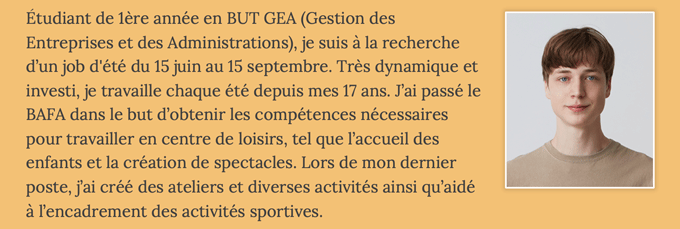
4. Describe your work experience (‘expérience professionnelle‘)
Just like in the US, you’ll need to highlight your work experience in a way that shows recruiters what kind of value you can add to the company you’re applying to.
Numbers are a language everyone understands, so add hard numbers to your bulleted work experience section to clearly demonstrate the value you can bring to the company you’re applying to, like so:
- Conception et implantation d’un business plan qui a permis une baisse de 5% des poids morts de l’inventaire, ainsi que le développement de la base client
- Management, formation et suivi des performances d’une équipe de 8 commerciaux
- Renforcement de la fidélisation de la clientèle grâce à un suivi personnalisé
In France, there are 2 ways to start your work experience bullet points:
- With nouns (“management”, “conception”, développement”)
- With action verbs conjugated in present or past tense
Using the first method is common, and many people write their work experience section like this. However, just like in English, the use of strong action verbs can help you stand out from other applicants by showing you’re a proactive and qualified candidate.
If you don’t have much work experience, don’t forget to add your volunteer work and job-relevant internships in this section.
5. Make your education clear to French employers (‘formation‘)
When applying for a job abroad, you’ll need to present your educational background a little differently by providing equivalent qualifications.
French recruiters are unlikely to understand the American education system, so be sure to translate your educational background into terms French employers can understand.
Educational background is highly valued in the French job market, so you want to make sure employers clearly understand that you’re qualified for the job.
Here’s a quick rundown of French equivalents of American diplomas:
- High school diploma or GED are equivalent to the French bac
- Technical diplomas are equivalent to the French CAP
- Associate’s degree is the equivalent to the French BTS, DEUST, or DUT (“bac+2”)
- Bachelor’s degrees are equivalent to a French Licence (“bac+3”)
- Master’s degrees are equivalent to a French Master (“bac+5”)
- Doctorates are equivalent to a French Doctorat (“bac+8”)
If you’re a student, you’ll need to find the equivalent of your GPA.
The French grading system uses a 20-point grading scale with 20 being the highest. Here’s a rough guide to help you make sense of your GPA to write as you would in the French system :
- +3.7 GPA – Mention très bien (17-20/20)
- 3.0-3.7 GPA – Mention bien (14-16/20)
- 2.3-3.0 GPA – Mention assez bien (12-14/20)
If you received any honorable mentions, be sure to include these as well:
- Highest honors (summa cum laude) – Mention très honorable
- High honors (magna cum laude) – Mention honorable
- Honors (cum laude) – Mention
If you’re unsure of where you fall, you can apply online for an “attestation de comparabilité” to help employers and academic institutions understand the French equivalent of your studies.
6. Add your skills (‘compétences‘)
Don’t directly translate your English skills into French using Google Translate because the wording may differ and sound unnatural.
Instead, identify which essential hard and soft skills in French you need to put in your skills section to stand out in a way that will sound natural to a French recruiter.
A good place to start is by identifying the skills required by the job advert and using those keywords word-for-word in your skill section, like this:
- Excellent esprit d’équipe
- Capacité d’analyse et esprit de synthèse
- Maîtrise des outils de communication digitale (MailChimp et email)
- Maîtrise des réseaux sociaux (Instagram, Twitter)
- Bonne connaissance de l’actualité
- Bonne gestion du stress
- Sens du relationnel
- Anglais (niveau C1)
7. Choose hobbies and interests that fit the job requirements (‘centres d’intérêt‘)
Just like any other information in your CV, the hobbies section of your French CV should be job-relevant or demonstrate highly sought-after transferable skills.
Mentioning hobbies that reflect well on you can highlight your positive attributes, for example:
- playing a team sport shows your ability to work well with others
- practicing a musical instrument shows your dedication
- learning a foreign language shows discipline and curiosity
- learning coding on your own shows you’re invested in learning new skills
- earning certificates throughout your lifetime shows you’re interested in continuous learning
You’ll want to place information regarding your French language proficiency towards the top of your CV because this is critical job-relevant information.
Be sure to use the CEFR (Common European Framework of References for Language) standards to specify your proficiency level like so:
- Français niveau C1
- Espagnol niveau B2
- Anglais natif/langue maternelle
While capitalization doesn’t matter in bullet points, be sure not to capitalize languages elsewhere on your French resume.
8. Ask a native French speaker to proofread your French resume
This step is all the more important when you’re writing in a language that isn’t your mother tongue. Always compare with other CVs available online from professionals of the same industry or sector as yourself, like on LinkedIn, for example.
However, you’ll want to have your CV proofread by a native French speaker, and multiple people if possible. This person could be your French teacher or tutor, or even your language exchange partner, for example. Get creative and consider online resources as well like French-language learning subreddits, while remembering to omit personal information.
Click to rate this article
4.3 Average rating


